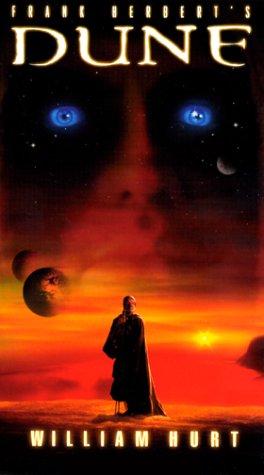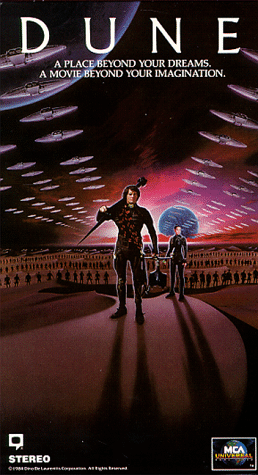

Guest reviewer Jonathan Harvey chimes in with a review of Part I of The Sci-Fi Channel's three-part Frank Herbert's Dune miniseries, with comments about David Lynch's 1984 version, too. Look for more from Jonathan after Parts II and III have aired.


12/4/00
The problem with both David Lynch's film version of "Dune" and the new mini-series of the same novel is their inaccessibility to some one who has not read the book.
When a novel is set in an unfamiliar setting, be it the Middle Ages or a remote future, there are basically two ways the novelist can get the reader familiar with the setting. One is to have characters talk about the situation in dialogue. Joe Blough says, "What do think of the new Emperor going to war against the tribe of Bollocks?" Jane Dough says, "It depends if the Ben-Gays stay neutral". The other is for the narrator to state to the reader directly a few things that are going on. For example, "Episode 5. A New Hope. It is a time of civil war. Luke Skywalker..."
In general, in cinema or stage plays, direct exposition is almost never an option. There are a few exceptions. There is the crawl in "Star Wars" just quoted. There is also the use of the so-called "chorus" frequent in Greek tragedy and also used in Shakespeare's "Henry V". Nonetheless, the writer of a movie or a play needs to master the art of revealing as much as possible about the situation through the character's dialogue as much as possible. The novelist can always engage in direct exposition to an enormous degree in a way that the screen writer or playwright cannot. In adapting a large popular novel to the screen, the screen writer risks unconsciously assuming on the viewer's part a much greater prior familiarity with the material than they actually have. It is possible to have read a book so many times that you forget what it was like to read it for the first time.
A few years ago my father tried to read Homer's Iliad. It was a rough go for him
because for all his erudition he is almost completely unfamiliar with Greek
mythology. Homer (for good reasons) assumes his audience from minute 1
knows exactly who Achilles and Agememnon, etc are, and he doesn't need to
explain their backgrounds to anyone. That was a reasonable assumption in his day. The
problem with *both* David Lynch's film version of "Dune" and the new
mini-series airing on the science-fiction channel is that watching either of them
is just like my father's experience of reading Homer's "Iliad".
To be sure, the problem is more serious in Lynch's version. In just over 2 hours, Lynch tried to keep all 30 of the book's major characters, and every subplot of the novel. There is a formal difference between a condensation of a book and an abridgement. A condensation snips a little bit here and a little bit there, but includes every scene in the book, while an abridgement may remove entire subplots and characters. (Hence, "Reader's Digest" insistence that their editions of books are condensed but not abridged.) I think that in a movie, condensation is almost always a mistake. One must go for abridgement. For example, the film version of "The Name of the Rose" there are 4 murders instead of 7. Laurence Olivier's Oscar-winning version of "Hamlet" eliminates the characters of Rosencrantz and Guildenstern entirely. Lynch's "Dune" is not an abridgement but a condensation which is so condensed that it has virtually evaporated.
The new mini-series of "Dune" does not have the problem of being inappropriately shortened as Lynch's film does. However, it still retains the problem of assuming a level of knowledge on the viewer's part that is not appropriate. The most glaring and obvious example of this is the fact in the entire first episode there is *NO* explanation of why "spice" is the most valuable substance in the universe (unless I blinked and missed it.) We are given a big hint, seeing a Guild Navigator who is a metamorphized human, but never are we told that spice is essential to navigating hyperspace and therefore for interstellar space travel. This was clearly laid out in Herbert's novel.
I must say one thing in favor of the new version. It lacks the
grotesque and ugly imagery of Lynch's version which was alien to Herbert's
novel. When I saw Lynch's movie I was utterly unprepared for Baron
Harkonnen's new means of keeping his slaves in line. In Lynch's movie, the slaves
have all been surgically implanted with "heart-plugs" which the Baron can
pull any time. These also made it into the comic book adaptation of Lynch's
film. This Lynchism is mercifully absent from from the new version.
12/19/00
Jonathon added:
I have not seen Part III of Dune (though I saw Part II *after*
submitting that review) and am indeed missing the final 15 minutes of Part
III on tape. If it gets repeated in January or can be gotten on video, I will
be sure to catch it.
My main reaction to Part II is bafflement as to why the fact that Paul apparently
is the Gesserit Messiah (in *addition* to being apparently the Fremen Messiah)
also known as the Kwizatz Hederach (spelling???) announced so *late*
in the production. We don't get *anything* about the KwHe until near the
end of Part II. The suspicion that Paul is the KwHe is announced somewhere
in the first 20 *PAGES* of the book, and indeed the pain-test on his
had that we **See without context** in the first 5 minutes of the TV
production is **in the book** part of a test to see if indeed he might
*BE* the KwHe. We see the test on TV with no explanation, and don't hear
mention of the KwHe till nearly 4 hours later. At least Lynch's version
*mentioned* the KwHe during the pain-test, even though Lynch failed to
explain what exactly it meant. The new version mentions it much too late,
and *also* fails to explain what it means.
Jon
Agree or disagree? Let me or Jon know.
Comments by Victor Kurzweil
Victor
Back to Kitsch Tour U.S.A.
Back to Official Frank Wu Homepage